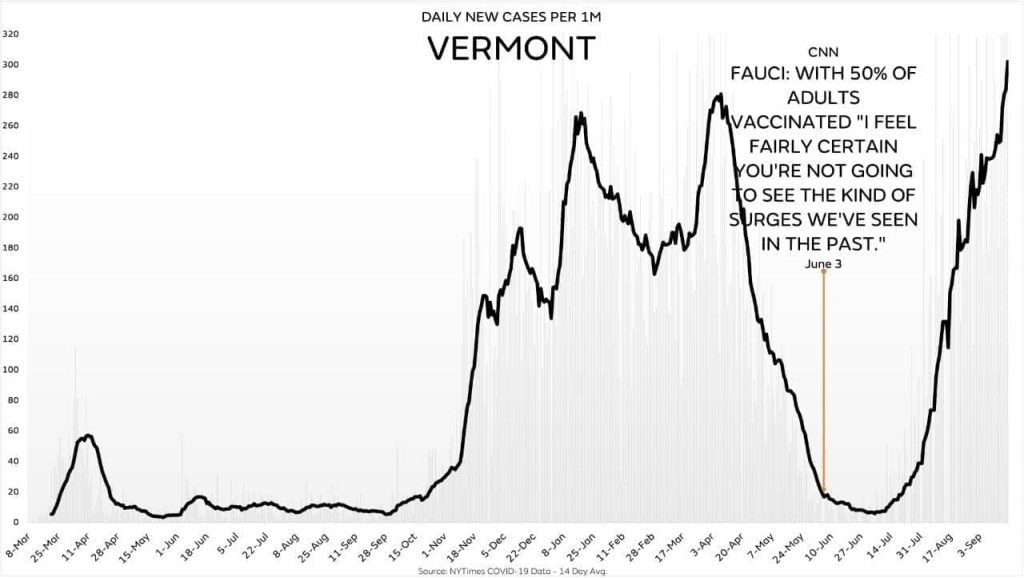Governments are mandating that employees take whatever drug the unelected officials have recommended, and businesses are doing the same. Many voices against 'Right to Try' are now saying there is no right to refuse—the result: lawsuits, resignations, shortages, and measurable improvement to profit only.
Mandating experimental drugs has not been proven to be effective in slowing spread or death. Credible experts say the jabs could be making things worse. Vermont leads the U.S. with 77.5% of its citizens suffering through one dose or more, but cases are accelerating anyway:
 Israel's data also suggests that jab mandates don't work. The country started the vaccine push early, has among the highest vaccination rates globally, and is experiencing a new wave of cases.
Israel's data also suggests that jab mandates don't work. The country started the vaccine push early, has among the highest vaccination rates globally, and is experiencing a new wave of cases.
In 1905 the U.S. Supreme Court heard Jacobson v. Massachusetts, in which an ordinance in Cambridge required that adults choose between a smallpox vaccination or a $5 fine. That case is said to give precedence to the notion that the state has the authority to impose drug mandates. The difference, though, is that the citizens still had a choice of paying a $5 fine. Those who agree with the Jacobson v. Massachusetts decision are logically inconsistent if they have any objection to government ownership over citizens' bodies; they endorse the state's absolute authority to compel bodily choice based on any whim from rulers.
Some Americans are choosing to join lawsuits or resign. Do harmful drugs, or face the relatively harmless contagion with the natural armor of the immune system?
In April, a Houston Methodist hospital announced a requirement that its employees get gene-jabbed before June 7 to keep their jobs—a first among hospital systems nationwide. On June 8, 178 employees who abstained were suspended. 117 joined a lawsuit that was dismissed. 150+ employees have either resigned or been fired, resulting in a nursing shortage.
In June, eight students at Indiana University sued over being required to inject an Emergency Use Authorization drug to maintain enrollment, even though the University allows exemptions and had backpedaled on any requirement to document it. Amy Coney Barrett provided an opinion for the ultimate Supreme Court ruling that denied the student's request for an emergency order against the University.
Lieutenant Colonel Paul Douglas Hague resigned and gave up his pension in August, calling Biden's mandate "unethical, immoral and tyrannical," saying he "cannot and will not contribute to the fall of this great nation and its people."
500 Los Angeles firefighters joined Firefighters4Freedom in a September lawsuit to repeal a mandate that threatens termination for not accepting experimental drug injection. Seven police officers sued the City of Denver last week, claiming that mandating them to jab themselves with substances that have less human testing than hydroxychloroquine and Ivermectin is unlawful and should be met with nullification. In San Francisco, Sheriff's Department employees have threatened to resign over mandates.
Progressive, the car insurance company that brought us Flo, announced this month that employees who do not accept experimental gene therapy would be fined, citing losses from claim payouts associated with the company medical plan. It's been rumored recently that the NBA will not require players to inject, while coaches, staff, and referees must.
As with vaccine passports, coercive drug injection policies are not always rooted in ideology, lobbying, grift, quid pro quo among the corrupt, or political pressure. Nor are they necessarily part of a profitability conspiracy with pharmaceutical interests (though there is precedent for that). Mandates can also arise from genuine fear for public health. Realistically, these simplifications are among many varied incentives that add to the decision to place patented chemicals inside of people who don't want it.
 Visual Capitalist https://www.visualcapitalist.com/tracking-covid-19-vaccines-around-the-world
Visual Capitalist https://www.visualcapitalist.com/tracking-covid-19-vaccines-around-the-world
Businesses making bottom-line evaluations find that exposure to lawsuits against them for being an accessory to transmission have more chance to harm them financially than lawsuits that may arise from firing people who don't take whatever drugs they are asked to take. After all, in addition to the right the employee has to leave the company there are typically exemptions one can claim and document. As of this writing, those exemptions are not yet considered domestic terrorism locally.
Beyond the dangers of allowing drug mandates on employees (or the dangers of not owning one's own business/having a small government, depending on perspective), drug mandates will purge the market and leave only those employees of a particular bent. Our hospitals will be filled with nurses and doctors willing to administer substances with unknown side effects. Our University educated students will be those who will submit unquestioningly to someone else's idea of what belongs inside their body.
The history of bureaucracy shows us that both will become further from milk over time.


